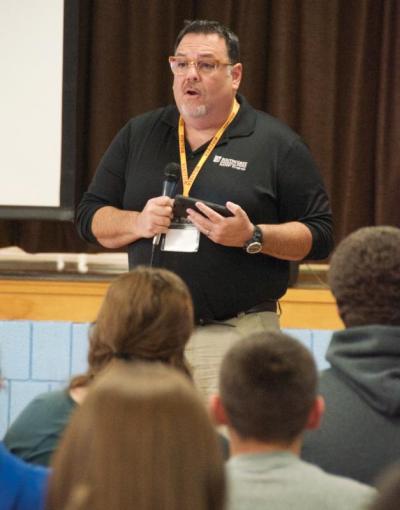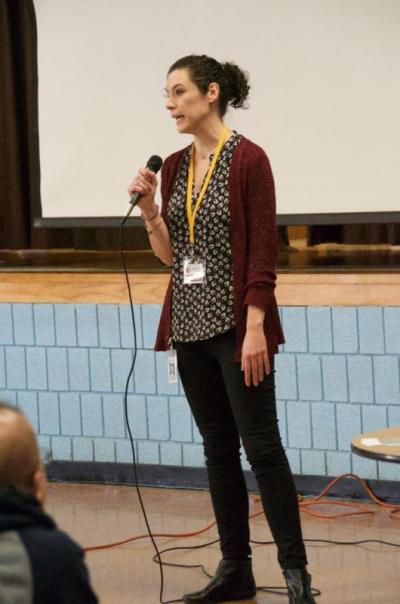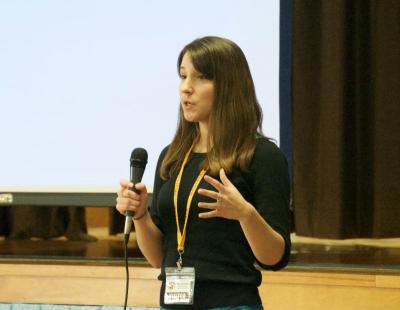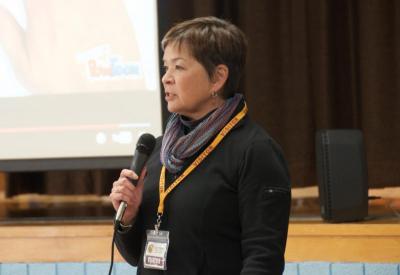Old Colony spotlights non-traditional careers
Working in a field dominated by another gender can be intimidating, but four professionals in non-traditional careers told students that their experiences have been more positive than negative.
On Tuesday, Old Colony Regional Vocational Technical High School held a session on non-traditional jobs for freshmen, who will soon declare which trade they want to study.
Non-traditional refers to any occupation where one gender represents less than 25 percent of the workforce, and it’s something Old Colony encourages.
“Old Colony has eighty-two students that qualify for non-traditional [shops],” said Samantha Clarke, the advisor for the Non-traditional Career Club and someone who works in the predominantly male field of culinary arts.
Clarke and the other professionals at the seminar said they could have chosen a different path, but they’ve found fulfillment, success, as well as great salaries, in their respective fields.
Cynthia Spence, a licensed general contractor, chose her career because it was lucrative and answered her need to see things accomplished. She said she hasn’t faced too much sexism in the workplace.
Once co-workers realize she’s there to get the job done, they generally stop questioning her authority, she said. But Spence did admit that sometimes it means, “being a little sharper” and developing resilience.
Lindsey Machamer, a civil engineer, said there are three female engineers out of 19 in her company, but her co-workers have always been supportive. Only four years out of college, she sometimes has to push back against others who discriminate based on her age not her gender.
As far as gender goes, she said it could be a boost in the job hunt.
“A lot of employers are trying to increase their diversity. That’s a potential benefit for you,” Machamer said.
Tina Landry, who works as a software engineer with ITT, said she has occasionally been mistaken for a secretary when working with clients, but she lets it roll off her back.
“Attitude is everything,” said Landry. “That goes for the guys and girls. If you can show you know what you’re talking about, you’ll be fine.”
A nurse for more than 20 years, Tim Velho, said he’s learned important life lessons through his work, but he’s gotten all the comments a male nurse can possibly get.
“There are established, entrenched prejudices that everyone has to overcome,” he said. “If you’re going to allow those things to be impediments to your career, you’re not gonna be successful.”
The speakers didn’t chose their occupations because they were non-traditional. Velho, whose mother, father, stepmother and sister are nurses, said his job picked him, but it took him until he was 29 to get his act together.
“You’ve got about a fifteen year head start on your career,” he told students. He encouraged them not to waste it and said male certified nursing assistants are needed. That’s something students can become while at Old Colony.
“Guys can be CNAs, They can be really good ones, too,” he said.
Several students in non-traditional shops at Old Colony also spoke, including Sarah Murphy.
She said her dad questioned his straight-A daughter’s choice to study a trade, but now she’s planning to become a welding engineer. Murphy has worked in her field while still a student.
“I like my job a lot better than something more traditional,” Murphy said, adding, “You’re kind of setting an example for other people.”
The timing of the session was meant to encourage freshmen as they choose an area of study. Catherine Calvin, who intends to enter the machine and tool shop, said she doesn’t have hesitations about entering a mostly male shop and she was encouraged that she might not meet too much gender discrimination when she does begin working.
Of those in the workforce she said, “It just showed that gender roles don’t matter to them either.”

















